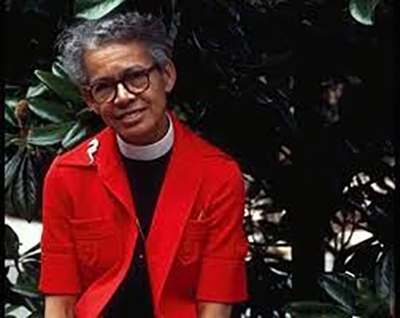By Don Valentine
Sadly, America’s schools often fail to teach about the Black Episcopal priest, the Reverend Dr. Pauli Murray. Rev. Murray was a lawyer, author, and women’s rights activist, and became the first Black person to earn a Doctor of the Science of Law degree from Yale, as well as the first Black woman to be ordained an Episcopal priest. (Editorial Note: Reverend Murray was gender nonconformist, and out of respect, we will not be using traditional pronouns.)
Born in Baltimore in 1910, Rev. Murray’s life was filled with a phenomenal array of achievements. These included co-founding the Congress of Racial Equality and the National Organization for Women (NOW) in 1966, and serving as Deputy Attorney General of California. Mademoiselle, named Rev. Murray Woman of the Year in 1947.
A prolific poet and author, Rev. Murray’s works include Song in a Weary Throat: An American Pilgrimage (1987), which received a Lillian Smith Book Award and a Robert F. Kennedy Book Award. Rev. Murray’s essays, poems, and books—including “Negroes Are Fed Up,” Dark Testament, and States’ Laws on Race and Color—were essential, foundational works of the civil rights movement. The Durham News & Observer reported that Murray’s 1950 book on segregation laws and the U.S. Constitution—called “‘the bible’” by Thurgood Marshall—guided the Supreme Court’s 1954 ruling in Brown v. Board of Education.
Family members frequently discussed activism, making home life an incubator for Rev. Murray’s first major act of social resistance: seeking gender-affirming hormone therapy. The Pauli Murray Center archives state that, “In 1938, s/he began a media and letter-writing campaign to enter graduate school at the all-white University of North Carolina. Despite a lack of support from the NAACP, Murray’s campaign received national publicity…” This campaign resulted in a lifelong friendship with Eleanor Roosevelt. In 1940, Rev. Murray was jailed for refusing to sit on broken seats at the back of a bus, becoming the first Black person to resist segregation on a bus in Virginia.
Rev. Murray worked closely with A. Philip Randolph, Bayard Rustin, and Martin Luther King Jr. but was also harshly critical of the male-dominated leadership within these civil rights organizations. This was a life dedicated to the fight against both racism and sexism.
